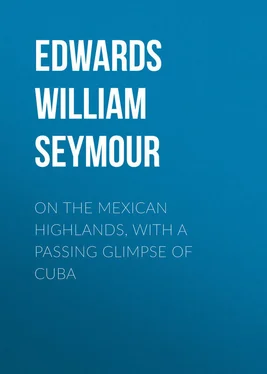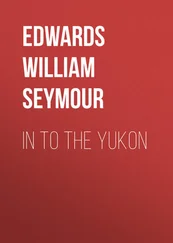William Edwards - On the Mexican Highlands, with a Passing Glimpse of Cuba
Здесь есть возможность читать онлайн «William Edwards - On the Mexican Highlands, with a Passing Glimpse of Cuba» — ознакомительный отрывок электронной книги совершенно бесплатно, а после прочтения отрывка купить полную версию. В некоторых случаях можно слушать аудио, скачать через торрент в формате fb2 и присутствует краткое содержание. Жанр: foreign_antique, foreign_prose, Путешествия и география, на английском языке. Описание произведения, (предисловие) а так же отзывы посетителей доступны на портале библиотеки ЛибКат.
- Название:On the Mexican Highlands, with a Passing Glimpse of Cuba
- Автор:
- Жанр:
- Год:неизвестен
- ISBN:нет данных
- Рейтинг книги:4 / 5. Голосов: 1
-
Избранное:Добавить в избранное
- Отзывы:
-
Ваша оценка:
- 80
- 1
- 2
- 3
- 4
- 5
On the Mexican Highlands, with a Passing Glimpse of Cuba: краткое содержание, описание и аннотация
Предлагаем к чтению аннотацию, описание, краткое содержание или предисловие (зависит от того, что написал сам автор книги «On the Mexican Highlands, with a Passing Glimpse of Cuba»). Если вы не нашли необходимую информацию о книге — напишите в комментариях, мы постараемся отыскать её.
On the Mexican Highlands, with a Passing Glimpse of Cuba — читать онлайн ознакомительный отрывок
Ниже представлен текст книги, разбитый по страницам. Система сохранения места последней прочитанной страницы, позволяет с удобством читать онлайн бесплатно книгу «On the Mexican Highlands, with a Passing Glimpse of Cuba», без необходимости каждый раз заново искать на чём Вы остановились. Поставьте закладку, и сможете в любой момент перейти на страницу, на которой закончили чтение.
Интервал:
Закладка:
All these pictures of the past, and many more, crowd thick upon me as I walk the streets and avenues of this now splendid modern city.
I have also tried to see what I could of the churches, – the more important of them – which here abound, but my brain is all in a whirl, and saints and Madonnas troop by me in confused and interminable train.
Ever since Cortez roasted Guatemozin upon a bed of coals, to hasten his conversion to the Roman faith and quicken his memory as to the location of Montezuma’s hidden treasure, the Spanish conquerors have been building churches, shrines and chapels to the glory of the Virgin, the salvation of their own souls and the profit of their private purse. Whenever a Spaniard got in a tight place, he vowed a church, a chapel or a shrine to the Virgin or a saint. If luck was with him, he hadn’t the nerve to back down, but made some show of keeping his vow and, the work once started, there were enough other vowing sinners to push the job along. Mexican genius has found its highest expression in its many and beautiful churches, and perhaps it has been a good thing for genius that so many sinners have been ready to gamble on a vow.
When Juarez shot Maximillian he also smote the Roman Church. The Archbishop of Mexico, and the church of which he was virtual primate, had backed the Austrian invader. Even Pope Pius IX had shed benedictions on the plot. When the Republic crushed the conspirators, the Roman Church was at once deprived of all visible power. Every foot of land, every church edifice, every monastery, every convent the church owned in all Mexico was confiscated by the Republic. The lands and many buildings were sold and the money put in the National Treasury. Monks and nuns were banished. Priests were prohibited from wearing any but ordinary garb. The Roman Church was forbidden ever again to own a rod of stone or a foot of land.
So now it is, that the priest wears a “bee-gum” hat and Glengarry coat, and the state takes whatever church-edifices it wants for public use. The church of San Augustin is a public library. Many churches have been converted into schools. Others have been pulled down, and modern buildings erected in their stead. The cloisters and chapel of the monastery of the Franciscans are leased to laymen, and have become the hotel Jardin. What churches the Republic did not need to use, it has been willing to rent to the Roman hierarchy for the religious uses of the people. So many have been these edifices that, despite the government’s appropriations and private occupations, there yet remain church buildings innumerable where the pious may worship and the priesthood celebrate the mass. But the Roman hierarchy has no longer the wealth and will to keep these buildings in repair and in all of those I visited there was much dilapidation.
While it is true that the stern laws of the Republic debar the Roman Church from owning land, yet, it is said, this law is now evaded by a system of subrosa trusteeships, whereby secret trustees already hold vast accumulations of land and money to its use. And although the church cannot go into court to enforce the trust, yet the threat of dire pains in Purgatory is seemingly so effective that there is said to have been extraordinary little loss by stealing. The promise of easy passage to Paradise also makes easy the evasion of human law.
VI
Vivid Characteristics of Mexican Life
This limpid atmosphere, this vivifying sun, – how they redden the blood and exhilarate the spirit! This is a sunshine which never brings the sweat. But yet, however hot the sun may be, it is cold in the shadow, and at this I am perpetually surprised.
The custom of the hotels in this Latin land is to let rooms upon the “European” plan, leaving the guest free to dine in the separate café of the hotel itself, or to take his meals wherever he may choose among the city’s multitude of lunch rooms and restaurants. Thus I may take my desayuno in an “American” restaurant, where the dishes are of the American type, and my almuerzo , the midmorning meal, in an Italian restaurant where the dishes of sunny Italy are served; while for my comida , I stroll through a narrow doorway between sky blue pillars, and enter a long, stone-flagged chamber, where neat tables are set about and where the Creole French of Louisiana is the speech of the proprietor. Here are served the most delicious meals I have yet discovered. If you want fish, a swarthy Indian waiter presents before you a large silver salver on which are arranged different sorts of fish fresh from the sea, for these are daily received in the city. Or, perhaps, you desire game, when a tray upon which are spread ducks and snipe and plover, the heads and wings yet feathered, is presented to you. Or a platter of beefsteaks, chops and cutlets is held before you. From these you select what you may wish. If you like, you may accompany the waiter who hands your choice to the cook, and you may stand and see the fish or duck or chop done to a turn, as you shall approve, upon the fire before your eyes. You are asked to take nothing for granted, but having ascertained to your own satisfaction that the food is fresh, you may verify its preparation, and eat it contentedly without misgiving. In this autumn season, flocks of ducks come to spend their winters upon the lakes surrounding the city. At a cost of thirty cents, our money, you may have a delicious broiled teal with fresh peas and lettuce, and as much fragrant coffee as you will drink. The food is cheap, wholesome and abundant. And what is time to a cook whose wages may be ten or fifteen centavos a day, although his skill be of the greatest!
The city is full of fine big shops whose large windows present lavish displays of sumptuous fabrics. There is great wealth in Mexico. There is also abject poverty. The income of the rich comes to them without toil from their vast estates, often inherited in direct descent from the Royal Grants of Ferdinand and Isabella to the Conquestadores of Cortez, when the fruitful lands of the conquered Aztecs were parceled out among the hungry Spanish compañeros of the Conqueror. Some of these farms or haciendas , as they are called, contain as many as a million acres.
Mexico is to all intents and purposes a free trade country, and the fabrics and goods of Europe mostly supply the needs and fancies of the Mexicans. The dry goods stores are in the hands of the French, with here and there a Spaniard from old Spain; the drug stores are kept by Germans, who all speak fluent Spanish, and the cheap cutlery and hardware are generally of German make. The wholesale and retail grocers have been Spaniards, but this trade is now drifting to the Americans. There are some fine jewelry stores, and gems and gold work are displayed in their windows calculated to dazzle even an American. The Mexican delights in jewels, and men and women love to have their fingers ablaze with sparkling diamonds, and their fronts behung with many chains of gold. And opals! Everyone will sell you opals!
In leather work, the Mexican is a master artist. He has inherited the art from the clever artificers among the ancient Moors. Coats and pantaloons (I use purposely the word pantaloons ) and hats are made of leather, soft, light and elastic as woven fibre. And as for saddles and bridles, all the accoutrements of the caballero are here made more sumptuously than anywhere in all the world.
The shops are opened early in the morning and remain open until noon, when most of them are closed until three o’clock, while the clerks are allowed to take their siesta , the midday rest. Then in the cool hours of the evening they stay open until late.
Over on one side of a small park, under the projecting loggia of a long, low building, I noticed, to-day, a dozen or more little tables, by each of which sat a dignified, solemn-looking man. Some were waiting for customers, others were writing at the dictation of their clients; several were evidently composing love letters for the shy, brown muchachas who whispered to them. Of the thirteen millions constituting the population of the Mexican Republic, less than two millions can read and write. Hence it is, that this profession of scribe is one of influence and profit.
Читать дальшеИнтервал:
Закладка:
Похожие книги на «On the Mexican Highlands, with a Passing Glimpse of Cuba»
Представляем Вашему вниманию похожие книги на «On the Mexican Highlands, with a Passing Glimpse of Cuba» списком для выбора. Мы отобрали схожую по названию и смыслу литературу в надежде предоставить читателям больше вариантов отыскать новые, интересные, ещё непрочитанные произведения.
Обсуждение, отзывы о книге «On the Mexican Highlands, with a Passing Glimpse of Cuba» и просто собственные мнения читателей. Оставьте ваши комментарии, напишите, что Вы думаете о произведении, его смысле или главных героях. Укажите что конкретно понравилось, а что нет, и почему Вы так считаете.












